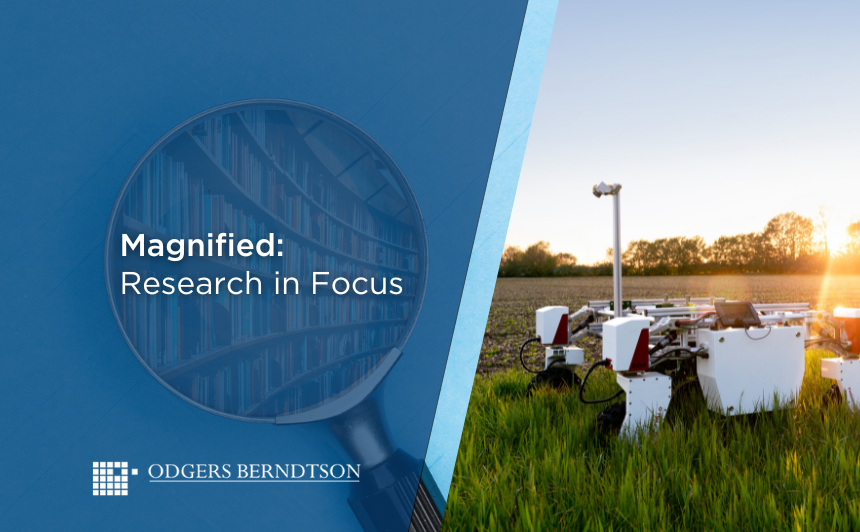Our Magnified: Research In Focus series presents new expert perspectives from research-led findings, allowing a diversity of voices to delve into some of the most significant and upcoming industry trends, news and developments.
We believe it is important to highlight innovative, data-led thinking by shining a spotlight on emerging talent at Odgers Berndtson – our researchers.
In the introduction to this series, Lucy Fitzpatrick, Researcher, Global Technology Practice takes a look into agri-tech and its evolving position in food production and consumerism.
"The intersection of technology with different sectors is one of the reasons why I enjoy my role in executive search at Odgers Berndtson. The rise of ‘hyphen-techs’, where traditional industries merge with digital, have allowed me to gain deeper insight into sectors including financial services, life sciences and energy & utilities to name just a few."
A rising ‘hyphen-tech’ that has seen significant advances recently is agri-tech; the intersection of technology and agriculture.
These advances point towards what is being defined as ‘the fourth agricultural revolution,’ underpinned by the rise of AI and the importance of data.
These solutions have the potential to revolutionize the way we produce food, making it more efficient and resilient to the effects of climate change and population growth. The UN’s Food and Agriculture Organisation stated that world food production needs to increase by 70% to feed the world population in 2050, and here are three key advances we are seeing in agri-tech that are combating this problem.
Vertical farming
Similar to the introduction of skyscrapers in the 19th Century, farming is pivoting from cultivating horizontally and is instead going up. Vertical farming is combatting the higher demand for food production and decrease in farmland by building solutions that use minimal space through vertically stacked layers. The crops are grown using hydroponic systems that provide the necessary nutrients, creating an environment with the optimal conditions by which plants can harvest with less soil.
For example, Intelligent Growth Solutions provide Growth Towers that not only improves yields but also highlights the benefit of more localized food production, boosting British economic growth and food security.
IoT and Precision Agriculture
IoT (Internet of Things) technologies are changing the way farmers interact with their farms allowing for more precise and efficient farming.
The deployment of sensors, connected devices and drones to capture data on crop yields, soil quality and weather patterns is increasing.
These allow farmers to optimize their practices to reduce waste, minimize costs and increase yields for both arable and livestock farms. For example, Hummingbird Technologies offers remote sensing capabilities which in turn provide actionable intelligence to farmers to inform decision-making around crop rotation, and other practices.
AI/Machine Learning and Big Data
Closely linked to the IoT technologies and the data they collect is the ever-rising use of AI and machine learning within agriculture. AI solutions are being developed to optimize crop management and efficiency. Through its predictive capabilities, AI technology can foresee weather patterns, crop yield, soil nutrients and other factors that directly impact farmer’s operational efficiency and cost.
An interesting AI driven, UK-based agri-Tech is Xihelm who have created an AI powered robot designed to harvest fruits and vegetables using AI to identify only the ripest fruit.
What does the new technology mean for the people working in Agri-Tech?
As highlighted already, hyphen-tech is the merging of physical and digital markets creating a new relevant hybrid. Working in executive search, we are often at the forefront of change and we’ve seen how other sectors have evolved to embrace technology, digitizing their products, while moving away from the physical to the virtual - fintech was the original disruptor with native banks disrupted by their digital-only equivalents. Very quickly these long-standing institutions realized that they must evolve or die!
The same is undoubtedly occurring in agri-tech, as digital solutions like AI disrupt tried and tested agricultural norms, and the benefits are beginning to be seen at both an output and profit level.
Traditional agriculture is embracing new technological opportunities but for this to really accelerate, new roles and hiring strategies are a key component to evolution. Imagine a data scientist now partnering hand-in-glove with a farmer. Not typical bed fellows, but a partnership that is unleashing real-world benefits of agri-tech - both experts in their field!
These alliances are creating new technology companies as these experts truly understand the issues facing food production and agriculture. This unlikely partnership of talent therefore gives me great hope that population growth and changing climate conditions can be overcome through the need and willingness to embrace change and innovation.
According to an article published in UKTech, the Department for Environment, Food & Rural Affairs (Defra) plans to spend around £600m in the next three years on grants and support for the agri-tech sector providing the necessary funds to fuel this critical to human life hyphen-tech.
To discuss the changing landscape of technology and your own organizational needs, please contact our Global Technology Practice directly or get in touch with us here or your local Odgers Berndtson contact.
Stay up to date: Sign up here for our newsletter OBSERVE, and receive the latest news in leadership and top talent, industry insights, and events directly to your inbox.



